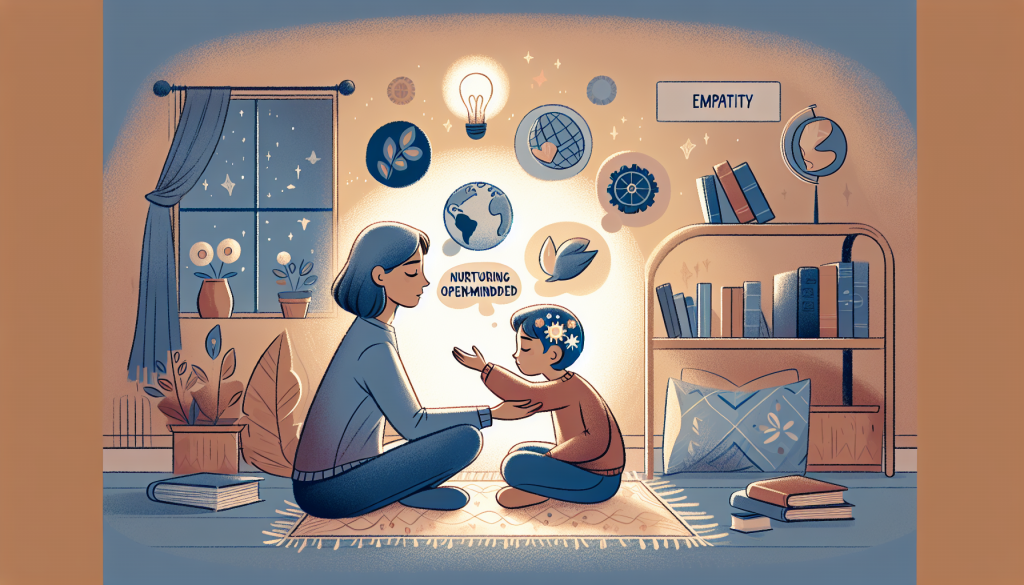“`html
Encouraging Children to Be Open-Minded
Introduction
As parents, one of our primary goals is to raise emotionally intelligent, thoughtful, and socially aware children. Teaching open-mindedness to children is a cornerstone of this effort. Open-mindedness not only helps kids adapt to a diverse world but also nurtures critical thinking and empathy.
In this article, we’ll explore why encouraging open-mindedness is crucial, backed by psychological principles such as cognitive-behavioral therapy (CBT). We’ll also provide actionable parenting strategies to help you foster this essential quality in your child.
Why Open-Mindedness Matters
Open-mindedness is more than just a desirable trait—it’s a skill that equips children to thrive in an increasingly interconnected world. It allows them to:
- Embrace diversity: Understanding and appreciating different perspectives fosters social awareness and helps build meaningful relationships.
- Develop critical thinking: Open-minded children are better equipped to analyze situations, question assumptions, and make informed decisions.
- Adapt to change: Flexibility and openness make it easier for kids to navigate life’s challenges.
Research supports the idea that fostering open-mindedness in children benefits their emotional and social well-being. According to a study on open-mindedness, children who are encouraged to explore new ideas are more likely to develop resilience and empathy.
Understanding the Psychology Behind Open-Mindedness
To effectively teach open-mindedness, it’s helpful to understand the psychological needs that drive a child’s behavior. According to principles of cognitive-behavioral therapy (CBT), children thrive when three key needs are met:
- Safety: Children need to feel secure in their environment to explore new ideas without fear of judgment or punishment.
- Autonomy: Encouraging kids to make choices fosters independence and confidence in their ability to think critically.
- Self-expression: Allowing children to voice their thoughts and feelings helps them develop empathy and communication skills.
When these psychological needs are addressed, children are more likely to approach new situations and ideas with an open mind.
Practical Parenting Strategies for Teaching Open-Mindedness
Here are some actionable tips to help you encourage open-mindedness in your child:
1. Model Open-Minded Behavior
Children learn by observing their parents. Demonstrate open-mindedness in your daily life by:
- Listening to others without interrupting.
- Considering different viewpoints, even if they challenge your beliefs.
- Admitting when you’re wrong and showing a willingness to learn.
2. Encourage Curiosity
Curiosity is the foundation of open-mindedness. Foster your child’s natural curiosity by:
- Encouraging them to ask questions and explore different topics.
- Providing access to books, documentaries, and other educational resources.
- Engaging in activities that expose them to different cultures, such as trying new cuisines or attending cultural events.
3. Teach Empathy
Empathy is a critical component of social awareness and open-mindedness. You can nurture empathy in your child by:
- Encouraging them to consider how others might feel in different situations.
- Discussing stories or scenarios where they can reflect on others’ perspectives.
- Modeling empathy in your own interactions.
4. Create a Safe Space for Discussions
Children need a safe and non-judgmental environment to express their thoughts and explore new ideas. To create this space:
- Encourage open dialogue and active listening.
- Avoid criticizing or dismissing their opinions.
- Celebrate their willingness to share and explore new concepts.
5. Expose Them to Diversity
Exposure to diverse perspectives and experiences can expand your child’s worldview. Consider:
- Introducing them to people from different backgrounds.
- Incorporating books and media that showcase diverse cultures and viewpoints.
- Encouraging participation in community activities or volunteer work.
Conclusion
Teaching open-mindedness to children is one of the most valuable gifts you can provide as a parent. By fostering curiosity, empathy, and social awareness, you equip your child with the tools to navigate an ever-changing world with confidence and compassion.
Remember, the journey toward open-mindedness begins at home. By modeling open-minded behavior, encouraging curiosity, and creating a safe space for discussions, you pave the way for your child’s growth into a thoughtful, understanding individual.
Start implementing these parenting strategies today, and watch as your child develops a broader perspective and a deeper appreciation for the world around them.
“`

